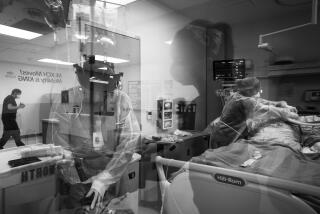Running a marathon without proper training could cause temporary heart damage, a study finds
- Share via
Finishing a marathon is a huge athletic feat, but not everyone who finishes one is in tip-top shape. A new study finds that people who have not trained appropriately and may not be in the best shape could temporarily damage their hearts.
The study, presented Monday at the Canadian Cardiovascular Congress 2010 in Montreal, focused on 20 healthy amateur runners who were given exercise, blood and MRI tests six to eight weeks before a marathon, two days after finishing, and some three months later. Researchers from the Heart and Stroke Foundation evaluated the results to see what, if any, damage was done to the runners’ hearts after completing the race.
Some less fit runners showed heart segment damage. “Compared to those runners with better training, they became more dehydrated and their hearts showed greater signs of injury,” said study co-author Eric Larose, professor of medicine at Laval University in Quebec, in a news release. “The less well trained runners also experienced greater loss of function associated with lower blood flow and greater irritation of heart segments.”
Larose added that the damage due to exercise is reversible, but could take up to three months to heal.
Short of doing an MRI before engaging in an endurance race such as a marathon, athletes could have their VO2max tested to see how fit they are. VO2max is the maximum amount of oxygen a person utilizes during rigorous exercise and is a measure of aerobic capacity. It can be tested in a lab or estimated using heart rate.
The popularity of marathons, triathlons and other endurance races are tempting many men and women to get off their sofas and start training for an event. But training could take weeks or months, depending on fitness levels, and shortcuts could end in injury or dropping out of the race.
“[P]hysical activity is very important for your heart health,” said foundation spokeswoman Dr. Beth Abramson in the release. “Just be smart about it: train and get medical advice. Not everyone will need extensive testing before training to run a marathon but speaking to your doctor about your cardiac risk is important.”
--Jeannine Stein / Los Angeles Times





